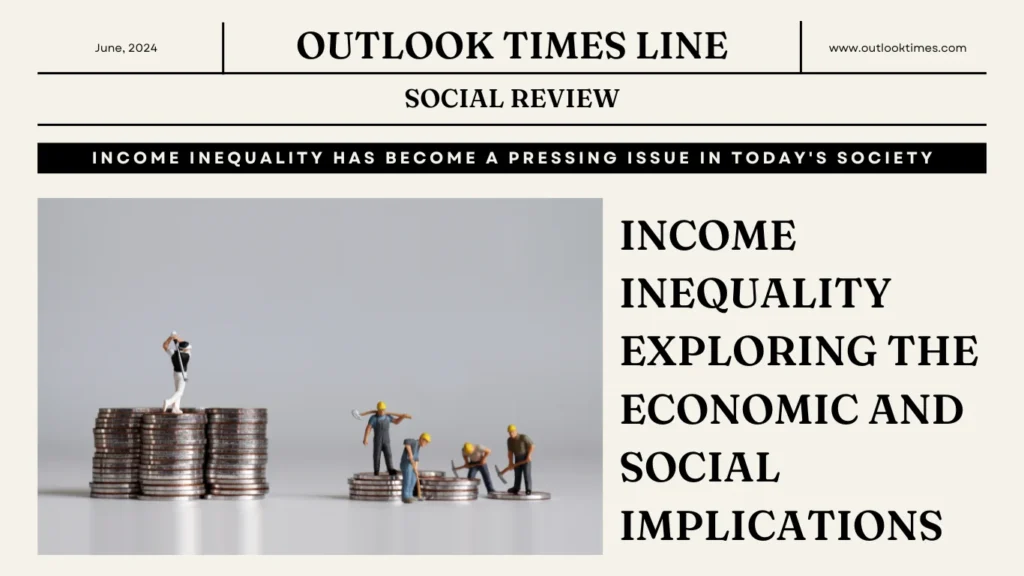
Income inequality has become a pressing issue in today’s society, with profound economic and social implications. As the wealth gap widens between the rich and the poor, it not only threatens economic stability but also undermines social cohesion and exacerbates disparities in health, education, and opportunities. In this article, we’ll delve into the causes and consequences of income inequality, as well as explore potential solutions to address this growing problem.
Understanding Income Inequality
Income inequality refers to the unequal distribution of income among individuals or households within a society. It is typically measured using indicators such as the Gini coefficient, which quantifies the extent to which income distribution deviates from perfect equality. While some level of income inequality is inevitable in any market-based economy, excessive inequality can have detrimental effects on both economic growth and social well-being.
Causes of Income Inequality
Several factors contribute to income inequality, including technological advancements, globalization, changes in labor market dynamics, and government policies. Technological innovations and automation, for example, have led to the polarization of the labor market, with high-skilled workers commanding higher wages while low-skilled workers face stagnant or declining incomes. Globalization has also played a role in widening income disparities, as the outsourcing of jobs to low-wage countries has put downward pressure on wages in advanced economies.
Economic Implications of Income Inequality
Income inequality can have significant economic consequences, including reduced consumer spending, lower economic mobility, and slower economic growth. When a significant portion of the population earns low incomes, consumer demand tends to stagnate, leading to decreased consumption and investment. Furthermore, income inequality can hinder intergenerational mobility, as children from low-income families face greater barriers to accessing quality education and job opportunities, perpetuating the cycle of poverty.
Social Implications of Income Inequality
Beyond its economic impact, income inequality also has profound social implications, contributing to social unrest, political polarization, and diminished social cohesion. High levels of income inequality can erode trust in institutions and undermine the social contract between citizens and governments. Moreover, disparities in income and wealth can exacerbate social divisions along lines of race, ethnicity, and gender, further marginalizing disadvantaged groups and fueling social tensions.
Health and Education Disparities
Income inequality is closely linked to disparities in health outcomes and educational attainment. Individuals with lower incomes are more likely to experience poor health outcomes, including higher rates of chronic diseases, lower life expectancy, and limited access to healthcare services. Similarly, children from low-income families are less likely to receive quality education and access to resources such as tutoring, extracurricular activities, and college preparation programs, perpetuating educational inequalities across generations.
Addressing Income Inequality: Policy Solutions
Addressing income inequality requires a multifaceted approach that combines policies aimed at promoting economic growth, increasing social mobility, and reducing disparities in income and wealth. Some potential policy solutions include:
Progressive taxation:
Implementing progressive tax policies that require higher-income individuals and corporations to pay a larger share of their income in taxes can help redistribute wealth and reduce income inequality.
Investing in education and workforce development:
Prioritizing investments in education, job training, and skill development can improve economic mobility and provide individuals with the tools they need to succeed in the modern economy.
Strengthening social safety nets:
Expanding access to social welfare programs such as healthcare, housing assistance, and unemployment benefits can help mitigate the negative impacts of income inequality on vulnerable populations.
Promoting fair labor practices:
Enacting policies that protect workers’ rights, ensure fair wages, and promote collective bargaining can help narrow the gap between high- and low-income earners and reduce income inequality.
The Importance of Addressing Income Inequality
Income inequality poses significant economic and social challenges that require urgent attention and action. By understanding the root causes and consequences of income inequality and implementing targeted policy solutions, we can work towards creating a more equitable and inclusive society where everyone has the opportunity to thrive. Addressing income inequality is not only a matter of social justice but also essential for promoting sustainable economic growth and building a more resilient and cohesive society for future generations.
Outlook Times
Explore the journeys of today’s most successful business leaders, uncovering the strategies, challenges, and triumphs that define their paths to success.
Trending
-
 Ignacio Bonasa
Ignacio Bonasa -
 Kathy Makino-Leipsitz
Kathy Makino-Leipsitz -
 Shaping Tomorrow: The Most Impactful Personalities of 2025
Shaping Tomorrow: The Most Impactful Personalities of 2025 -
 Dr. Harsha Thennarasu
Dr. Harsha Thennarasu -
 Vaibhav Sharma
Vaibhav Sharma -
 Ignacio Bonasa
Ignacio Bonasa -
 Beyond AI Hype: The Next Wave of Technologies Reshaping 2025
Beyond AI Hype: The Next Wave of Technologies Reshaping 2025 -
 Are Hybrid Work Cultures Sustainable? The Truth Behind the 2025 Corporate Experiment
Are Hybrid Work Cultures Sustainable? The Truth Behind the 2025 Corporate Experiment -
 “When AI Directs the Camera: Will Sora 2 Rewrite the Future of Filmmaking?
“When AI Directs the Camera: Will Sora 2 Rewrite the Future of Filmmaking? -
 Top Trailblazing Leaders to Watch in 2025
Top Trailblazing Leaders to Watch in 2025 -
 Top 5 Power Profiles: Redefining Global Leadership in 2025
Top 5 Power Profiles: Redefining Global Leadership in 2025 -
 Icons of Impact: Legendary Leaders Shaping Success in 2025
Icons of Impact: Legendary Leaders Shaping Success in 2025 -
 Ronit Pinto
Ronit Pinto -
 Beyond Limits: How Alloy Is Redefining Fitness Franchising
Beyond Limits: How Alloy Is Redefining Fitness Franchising -
 Firdaus Nagree
Firdaus Nagree -
 The Most Promising Tech Innovation of the Future
The Most Promising Tech Innovation of the Future -
 AI Excellence in Business Process Management
AI Excellence in Business Process Management -
 Iconic Voice in Soulful Leadership & Cultural Impact – 2025
Iconic Voice in Soulful Leadership & Cultural Impact – 2025 -
 Visionary Leaders: The Most Trailblazing Personalities Shaping 2025
Visionary Leaders: The Most Trailblazing Personalities Shaping 2025 -
 The Power Players: Most Dynamic and Impactful Personalities to Follow in 2025
The Power Players: Most Dynamic and Impactful Personalities to Follow in 2025 -
 The Unshakable Pillar of Modern Healthcare, 2025
The Unshakable Pillar of Modern Healthcare, 2025 -
 Dr. Aidan Mouat
Dr. Aidan Mouat -
 Trailblazing Legend: Iconic Leader Who Inspire the World
Trailblazing Legend: Iconic Leader Who Inspire the World -
 Sukh Sandhu
Sukh Sandhu -
 Ctoday Awards : Leaders Awards 2024,Felicitated Top Companies & Individuals
Ctoday Awards : Leaders Awards 2024,Felicitated Top Companies & Individuals
